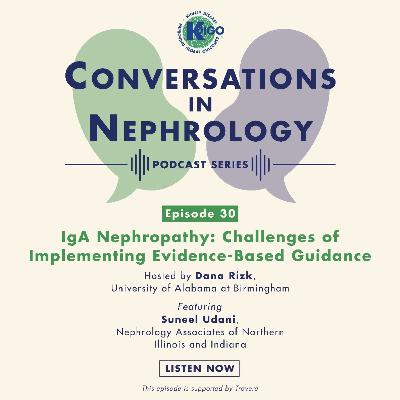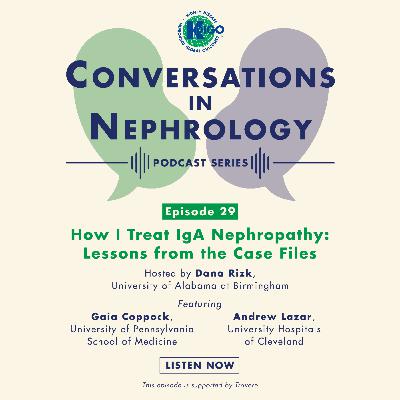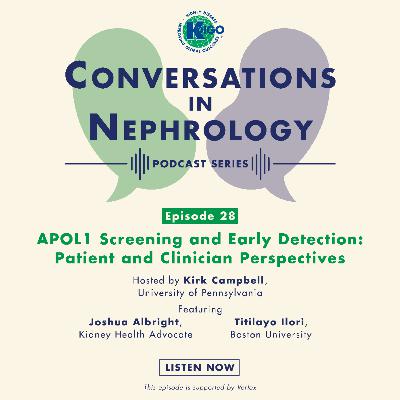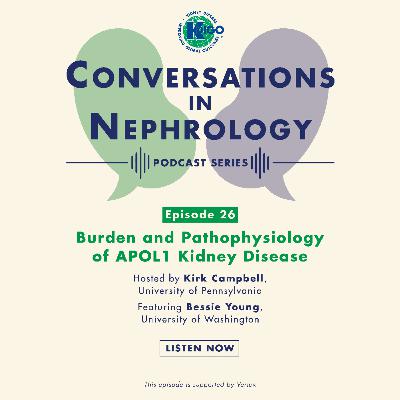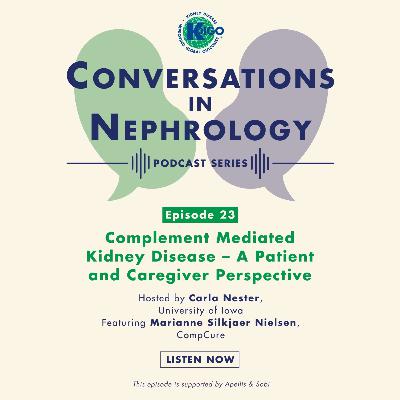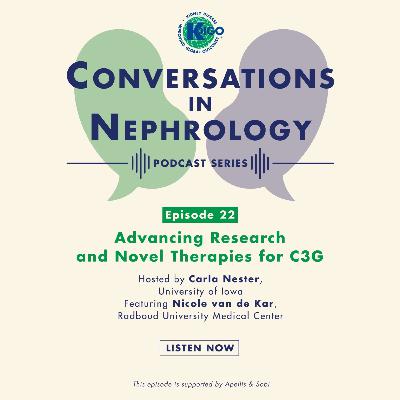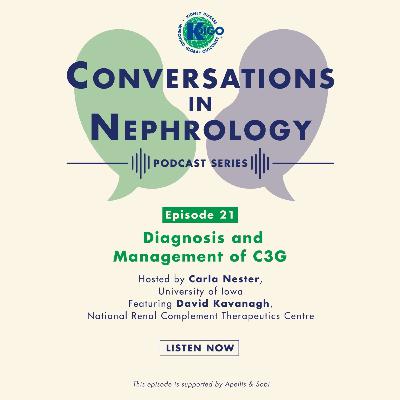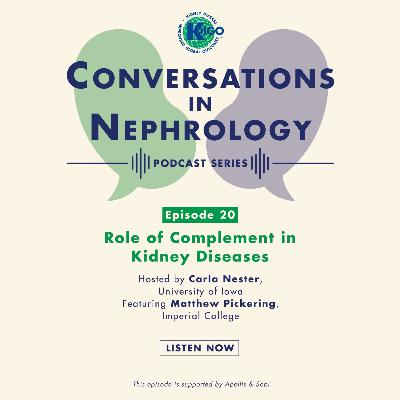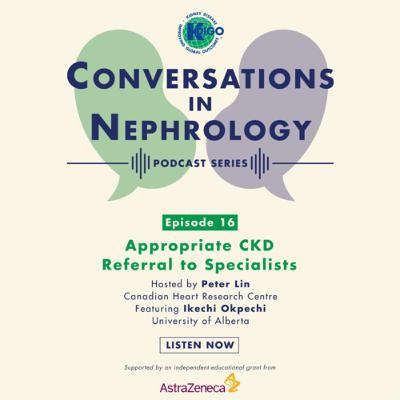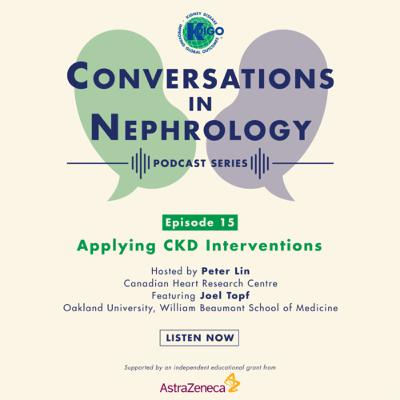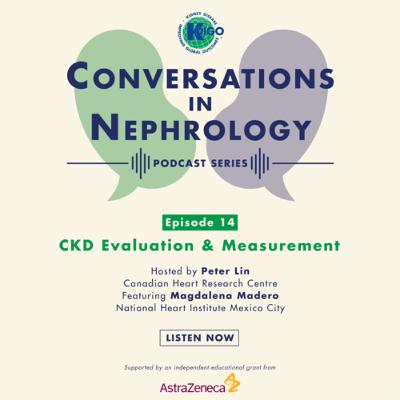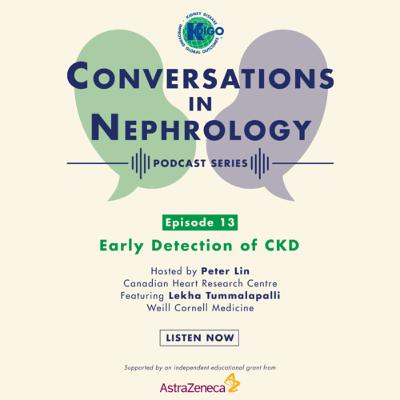Discover KDIGO Conversations in Nephrology
KDIGO Conversations in Nephrology

30 Episodes
Reverse
This final episode in KDIGO’s four-part IgAN series focuses on the challenges and opportunities of implementing the updated KDIGO IgAN Guideline in clinical practice. The conversation examines a shifting treatment paradigm that emphasizes earlier intervention and simultaneous, multi-targeted therapy, while addressing persistent barriers to guideline adoption, including gaps in disease awareness, diagnostic precision, and risk stratification. Drawing on insights from recent clinical trials, the discussion also explores how emerging evidence is shaping therapeutic decision-making, highlights priority areas for future IgAN research, and considers what continued innovation may mean for improving long-term patient outcomes.The episode is hosted by Dana Rizk, MD (University of Alabama at Birmingham, US), and features Suneel Udani, MD (Nephrology Associates of Northern Illinois and Indiana, US). Previous episodes in the series feature KDIGO IgAN Guideline Co-Chair Brad Rovin, MD (The Ohio State University College of Medicine, US), Shikha Wadwani, MD (Cedars Sinai, US), Andrew Lazar, MD (University Hospitals of Cleveland, US), and Gaia Coppock, MD (University of Pennsylvania Medicine, US).This podcast series was supported by Travere.
This third episode in KDIGO’s four-part IgAN series explores how to apply KDIGO guidance in real-world IgAN care through two illustrative patient cases. Building on earlier episodes in the series, the discussion highlights dynamic risk assessment, treatment selection, and monitoring strategies, along with practical decisions about RAS inhibitors versus DEARAs, TRF-budesonide versus systemic glucocorticoids, and the use of SGLT2 inhibitors. The episode also addresses complex scenarios, including rapidly progressive glomerulonephritis, nephrotic syndrome, acute kidney injury, pediatric IgAN, pregnancy, and treatment considerations in resource-limited settings. The episode is hosted by Dana Rizk, MD (University of Alabama at Birmingham, US), and features Gaia Coppock, MD (University of Pennsylvania Medicine, US), and Andrew Lazar, MD (University Hospitals of Cleveland, US). Previous episodes in the series feature KDIGO IgAN Guideine Co-Chair Brad Rovin, MD (The Ohio State University College of Medicine, US), and Shikha Wadwani, MD (Cedars-Sinai, US). The fourth and final episode will be released in December 2025 and will focus on the challenges of implementing evidence-based guidance, emerging therapies, and key research needs.This podcast series was supported by Travere.
In the final episode of KDIGO’s three-part Conversations in Nephrology series on APOL1 kidney disease, host Kirk Campbell, MD (University of Pennsylvania, United States), speaks with Titilayo Ilori, MD (Boston University, United States), and kidney health advocate Joshua Albright (United States) about how APOL1 genetic testing can shape the future of kidney care. Their conversation brings together clinical expertise and lived experience to examine why early detection matters, how to overcome barriers to equitable testing, and what it will take to turn awareness into meaningful action for patients and communities.Learn more and access resources from the KDIGO Controversies Conference on APOL1 Kidney Disease: https://kdigo.org/conferences/apol1-kidney-disease/This podcast was supported by Vertex Pharmaceuticals.
In this second installment of KDIGO’s three-part podcast series on APOL1 kidney disease, host Kirk Campbell, MD (University of Pennsylvania, United States), welcomes Barry Freedman, MD (Wake Forest University School of Medicine, United States) for a practical discussion on patient management. They examine how APOL1 risk variants influence progression, review current therapeutic approaches, and explore emerging targeted treatments designed to improve care and outcomes for affected individuals.Learn more and access resources from the KDIGO Controversies Conference on APOL1 Kidney Disease: https://kdigo.org/conferences/apol1-kidney-disease/This podcast was supported by Vertex Pharmaceuticals.
This is the first episode of a three-part KDIGO Conversations in Nephrology series on APOL1 kidney disease. Host Kirk Campbell, MD (University of Pennsylvania, United States), speaks with Bessie Young, MD (University of Washington, United States) about the discovery, burden, and biology of APOL1 kidney disease. Their discussion explores how APOL1 variants contribute to increased kidney disease risk in people of African ancestry, recent findings on protective variants, and ongoing research toward targeted therapies.Learn more and access resources from the KDIGO Controversies Conference on APOL1 Kidney Disease: https://kdigo.org/conferences/apol1-kidney-disease/This podcast was supported by Vertex Pharmaceuticals.
This second episode in KDIGO’s four-part IgAN series addresses the treatment revolution in IgAN. Join Dana Rizk, MD (University of Alabama at Birmingham, US), and Shikha Wadhwani, MD (University of Texas Medical Branch, US) in understanding how disease pathophysiology is fueling a wave of new therapies that go beyond traditional supportive care. Key topics include what's changed since the KDIGO 2021 Guideline, the four-hit hypothesis and its role in driving novel therapies, key factors to consider when selecting treatments, and the evolving role of traditional approaches alongside newer agents.The first episode in this series (Episode #24) features KDIGO IgAN Guideline Co-Chair, Brad Rovin, MD (University of Ohio Medicine, US). Future episodes (Episode #29 and Episode #30) feature Shikha Wadwani, MD (Cedars Sinai, US), Andrew Lazar, MD (University Hospitals of Cleveland, US), Gaia Coppock, MD (University of Pennsylvania Medicine, US), and Suneel Udani, MD (Nephrology Associates of Northern Illinois and Indiana, US), and cover lessons from IgAN Case Files, and challenges and strategies to implementing KDIGO IgAN Guideline recommendations.This podcast was supported by Travere.
This is the first episode in KDIGO's four-part series on the KDIGO 2025 IgAN/IgAV Guideline. Join Dana Rizk, MD (University of Alabama at Birmingham, United States), and Brad Rovin, MD (Ohio State University, United States), Co-Chair of the 2025 KDIGO IgAN Guideline, for a deep dive into the latest updates in patient care. Their conversation explores the key takeaways from the new guideline, the critical role of kidney biopsies in diagnosis and prognosis, the use of the IgAN prediction tool for risk assessment, and the updated thresholds and treatment goals aimed at improving outcomes.Future episodes (Episode #25, Episode #29, and Episode #30) feature Shikha Wadwani, MD (Cedars Sinai, US), Andrew Lazar, MD (University Hospitals of Cleveland, US), Gaia Coppock, MD (University of Pennsylvania Medicine, US), and Suneel Udani, MD (Nephrology Associates of Northern Illinois and Indiana, US), and cover the treatment revolution in IgAN, lessons from IgAN Case Files, and challenges and strategies to implementing KDIGO IgAN Guideline recommendations.This podcast was supported by Travere.
What does life with a rare kidney disease really look like?Marianne Silkjaer Nielsen (Founder of CompCure, Denmark) offers a powerful voice for patients and caregivers. She reflects on the long diagnostic journey, the challenges of managing rare kidney disease, and the need for better awareness, advocacy, and international registries to improve outcomes.This episode is part of a four-part KDIGO Conversations in Nephrology series on complement-mediated kidney diseases, hosted by Dr. Carla Nester (University of Iowa Stead Family Children’s Hospital, United States).This series was supported by Apellis and Sobi.
What does the future of treatment for C3 Glomerulopathy (C3G) look like? Dr. Nicole van de Kar (Radboud University Medical Center, The Netherlands) unpacks the pathophysiology of C3G, from genetic and autoantibody factors to the central role of the alternative pathway. She explores the limits of current C5 therapies and the potential of new strategies targeting C3 activation that could reshape patient care worldwide. This episode is part of a four-part KDIGO Conversations in Nephrology series on complement-mediated kidney diseases, hosted by Dr. Carla Nester (University of Iowa Stead Family Children’s Hospital, United States).This series was supported by Apellis and Sobi.
How do patients with C3 Glomerulopathy (C3G) present, and why is confirming the diagnosis so complex? Dr. David Kavanagh (National Renal Complement Therapeutics Centre, United Kingdom) walks through the diagnostic process, the shortcomings of traditional immunosuppression, and the promise of emerging therapies like alternative pathway inhibitors. He also tackles one of the toughest challenges: managing post-transplant recurrence.This episode is part of a four-part KDIGO Conversations in Nephrology series on complement-mediated kidney diseases, hosted by Dr. Carla Nester (University of Iowa Stead Family Children’s Hospital, United States).This series was supported by Apellis and Sobi.
Why does it matter if a kidney disease is complement-driven or complement-associated? Dr. Matthew Pickering (Imperial College London, United Kingdom) explains this critical distinction and why it changes how clinicians approach diagnosis and treatment. The discussion explores promising new therapies such as C3 and C5 inhibitors and how biomarkers are paving the way for precision medicine in nephrology. This episode is part of a four-part KDIGO Conversations in Nephrology series on complement-mediated kidney diseases, hosted by Dr. Carla Nester (University of Iowa Stead Family Children’s Hospital, United States).This series was supported by Apellis and Sobi.
Episode 19 is the third episode in KDIGO's three-episode series on acute kidney injury (AKI), hosted by Dr. Kathleen Liu (University of California at San Francisco, United States).
In this episode, Dr. Liu and Dr. Claudio Ronco (International Renal Research Institute of San Bortolo Hospital, Italy) discuss recent advancements and best practices surrounding Extracorporeal Blood Purification within the complex scenario of multiorgan support. This thought-provoking discussion, explores:
Recent clinical trials suggesting minimal benefits of early CRRT in AKI for critically ill patients. The conversation delves into whether these findings translate to patients experiencing multiorgan failure, exploring the potential differentiating factors.
The potential of CRRT to extend beyond renal support. The discussion explores how CRRT might offer support to other vital organs in the setting of multiorgan system failure.
The role of current CRRT technology in eliminating inflammatory mediators. Dr. Ronco sheds light on the capabilities of current technology and its potential impact on the inflammatory response.
Join Dr. Liu and Dr. Ronco for an insightful exploration of extracorporeal blood purification’s evolving role in optimizing care for critically ill patients.
This episode is supported by an independent educational grant from Baxter.
Episode 18 is the second episode in KDIGO's three-episode series on acute kidney injury (AKI), hosted by Dr. Kathleen Liu (University of California at San Francisco, United States). In this episode, Dr. Liu is joined by Dr. Kianoush Kashani (Mayo Clinic, United States) to discuss the rising importance of personalized care in AKI treatment. They delve into the world of digital health, exploring how digital decision support tools can empower clinicians and improve patient outcomes.
This episode will address:
Digital Health: Dr. Kashani breaks down the concept of digital health and its applications in the context of AKI management.
The Power of Digital Tools: Discover how digital decision support systems can aid clinicians in early detection, risk stratification, and personalized treatment plans for AKI patients.
Personalized Care for AKI: Dr. Liu and Dr. Kashani explore why a one-size-fits-all approach doesn't work for AKI, and how digital tools can pave the way for individualized care.
Optimizing KRT Outcomes: Learn how digital health can improve decision-making around KRT, leading to better patient outcomes.
Tune in for this informative discussion on leveraging the power of digital health to personalize AKI care.
This episode is supported by an independent educational grant from Baxter.
This is the first episode in KDIGO's new 3-episode series on acute kidney injury (AKI), hosted by Dr. Kathleen Liu (University of California at San Francisco, United States). In this episode, Dr. Liu is joined by Dr. Jay Koyner (University of Chicago, United States) to discuss the emerging field of persistent acute kidney injury (AKI).
They delve into the question: what exactly is persistent AKI, and how does it differ from severe AKI? Dr. Liu and Dr. Koyner explore the key factors clinicians should consider when evaluating a patient's risk of developing persistent AKI. They also highlight the latest developments in this area of nephrology research, leaving listeners with valuable insights into the diagnosis and management of persistent AKI.
Join us as we discuss:
What is persistent AKI, and how is it distinguished from severe AKI?
What clinical factors should be considered when assessing a patient's risk of persistent AKI?
What are some of the new developments in the field of persistent AKI research?
How can this knowledge be applied to improve patient care?
This episode is supported by an independent educational grant from Baxter.
In this episode, Dr. Peter Lin (Canadian Heart Research Centre, Canada) and Ikechi Okpechi (University of Alberta, Canada) discuss the right time to refer patients with CKD to a nephrologist. This episode also addresses rapid CKD progression and the utility of risk prediction equations.
This episode is supported by an independent educational grant from AstraZeneca.
Join host Dr. Peter Lin (Canadian Heart Research Centre, Canada) in conversation with Dr. Joel Topf (Oakland University, William Beaumont School of Medicine, USA) as they discuss how to combat CKD progression and the role of non-pharmacological vs pharmacological interventions. This episode will explore whether foundational therapies are underused and how to tailor the right treatment for the right patient at the right time.
This episode is supported by an independent educational grant from AstraZeneca.
In this episode, Dr. Peter Lin (Canadian Heart Research Centre, Canada) and Dr. Magdalena Madero (National Heart Institute Mexico City, Mexico) discuss best practices for CKD evaluation and measurement. This episode focuses on the importance of assessing GFR and albuminuria, identifying the causes of CKD, CKD progression, and when more accurate GFR measures (such as cystatin) should be conducted.
This episode is supported by an independent educational grant from AstraZeneca.
Join host, Dr. Peter Lin (Canadian Heart Research Centre, Canada) and Dr. Lekha Tummalapalli (Weill Cornell Medicine, United States) as they discuss the importance of early CKD detection. This episode explores risk factors, screening for CKD, and country specific factors to take into account when screening for CKD.
This episode is supported by an independent educational grant from AstraZeneca.
Show Notes:
https://kdigo.org/conferences/early-identification/
https://www.theisn.org/blog/2023/05/22/new-quick-guide-to-early-ckd-identification-and-intervention-for-primary-care-settings-available-in-50-languages-by-year-end/
https://www.theisn.org/initiatives/ckd-early-screening-intervention/
In this episode, host Dr. Vladimir Tesar (General University Hospital, Prague) and Dr. Micheal Walsh (McMaster University, Canada) explore the benefits of plasma exchange for patients with ANCA-associated vasculitis. This episode discusses how to identify patients who may benefit from plasma exchange and the role of plasma exchange in patients with double-positive ANCA and anti-GBM. The utility of rituximab in those also treated with plasma exchange will be addressed.
This episode is supported by Amgen.
In this episode, host Dr. Vladimir Tesar (General University Hospital, Prague) and Dr. David Jayne (Addenbrooke's Hospital, United Kingdom) discuss the roles of various agents in the induction and maintenance treatment of ANCA- associated vasculitis. They will explore the use of rituximab and complement inhibition in treating ANCA-associated vasculitis. This episode will address the gaps in knowledge and ongoing research in the field of ANCA-associated vasculitis.
This episode is supported by Amgen.


